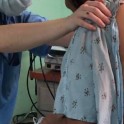Growing up, I never knew I wanted to be a doctor. My talent and passion had always been in writing. On my first day of twelfth grade English class, our first assignment was to write a college essay, list our top colleges, and pick our major. After years of personal struggles and a tumultuous home life, I was at a loss. I never thought college would be on the horizon for me. During this time, I had a discussion with my English teacher about a creative piece I had written for her fiction class. She had told me directly, “I have some good news and some bad news. Writing, English, and a love of fiction is something you will have for the rest of your life. You will never escape it.” It seemed then that the answer was clear: writing would be my career. I began college at City College of New York in the Fall as an English major. From there, I expected it to be a linear path, but as many people say, life doesn't always work out the way you expect it to. Within two months at CCNY, I knew I wasn't being challenged enough, and had fallen into writing solely because I knew it was the one thing I could do well. I wasn't fulfilled in my choice of university or in my studies, so with no plan beyond the knowledge I needed change, I began my transfer applications soon after. The moment I knew I wanted a career in medicine was spent in the pre-surgical unit of Mather Memorial Hospital. While being prepped for a minor procedure, I was placed in a bed next to a woman waiting for an operation on her leg. With nothing but a thin curtain between us, I listened while she had a pre-surgical conversation with the attending anesthesiologist. He went through the normal questions with her, asking about any past medical history, if she had followed pre-surgical instructions, and finally, if she had any questions of her own. It was the next thing she said that changed my life forever: “No, I just want my life back. I want to do the things I used to be able to do. Can you give me my life back?” The anesthesiologist assured her that, yes, they would give her her life back, and it was at that moment I finally knew what I wanted to do. I wanted to be the person who could say that. I wanted to be the person who could give others their lives back. Just as life doesn't always work out linearly, the road to what you want isn't so simple. I transferred to a more academically challenging university and still dealt with the same struggles from before college. My younger siblings still needed help at home, I still needed to deal with my personal battles, and halfway through my academic career, I began helping my partner raise his only daughter, whose mother was not a part of her life. I struggled academically, with the feelings of doubt about my intelligence, and with balancing out all of my familial duties. Just when I felt that maybe I should give up, that maybe this path couldn't be for me, my mother committed suicide. When I received the news, I wish I could say I knew exactly how to feel, whether devastated, confused, or even a sense of relief that her struggle had ended, but I was at a total loss on how to handle the emotions that seemed to change with every passing second. It was usually at this point that I turned to creativity and writing for help, but instead, I turned to medicine. To cope, I suggested to my siblings that we set up a fundraiser for a clinic I had volunteered at in Peru in my mother's honor. Within a week, we had raised enough money for the clinic to receive new lab equipment, and for her sister clinic to renovate a new laboratory. Suddenly, I had my purpose again. In the darkest moment of my life, I found peace in helping others, in the beauty of what science and medicine could do, and in the knowledge that throughout life's challenges, I would have a love of medicine for the rest of my life. I would never escape it. Medicine is numbers, it is facts from a textbook, it is logic, but it also creativity, passion, endurance, and something that I am, and will always be deeply in love with.








